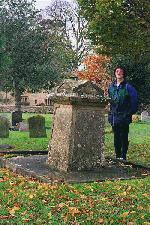William Noble Edden was murdered by some person or persons unknown as he walked home from market one night in 1828. He met his death near the village of Haddenham, Bucks, but lived in Thame, just over the county border in Oxfordshire. His wife was at home in their cottage but she had a clairvoyant vision of the murder and told disbelieving neighbours her husband would not return home that night as his body lay in a ditch somewhere. The neighbours tried to calm her, disbelieving her vision, but the next morning Noble’s body was discovered and a murder inquiry was begun.
The authorities, already surprised by the accuracy of Mrs Edden’s vision, had an even bigger surprise coming: she announced that in the vision she had also seen the face of the murderer. And that murderer was one she knew to be called Benjamin Tyler.
Tyler, of course, denied the charge but nearly a year later Tyler was arrested for the murder – largely on the testimony of a labourer, Solomon Sewell. Sewell told the magistrates he had seen Tyler hit Noble Edden with a hammer. Tyler dismissed this as nonsense and his main line of defence was the Sewell was a simpleton and his word could not be trusted. Indeed among those testifying that Sewell was of unsound mind was Sewell’s own mother. Mrs Edden told the magistrates of her vision on that night.
She said: “On the night of the murder I was ironing; something rushed over me, and I thought I heard the voice of my husband. I ran out and said, ‘Oh dear God, my husband is being murdered’. I told this to several persons before I heard the news; I thought I saw my husband’s apparition and the man that done it was Tyler. That was the reason I sent for him after the body was brought home; I sent many time, but he wouldn’t come. I wanted him to touch the corpse.”
The reason why she wanted Tyler to touch the corpse arises from the superstition that the body of a murdered man has the power to point out the murderer. King James I in his Demonology says: “In a secret murder, if the dead carcass be at any time thereafter handled by the murderer it will gush out of blood, as if the blood were crying to Heaven for revenge.”
The magistrates released Tyler declaring that the testimony of Sewell was completely untrustworthy. On his release Tyler went to Thame, gaily dressed in ribbons, where he annoyed the witnesses who had given evidence against him, by dancing before their doors. But if Tyler had in the back of his mind the age-old couplet, “If you have done murder and wish to get clear, Take care and be tried in Buckinghamshire” his trust was misplaced. In 1830 Tyler was again rearrested, still largely on Sewell and Mrs Edden’s testimony, and eventually committed for trial with Sewell on the capital charge of murdering William Edden. The trial took place in Aylesbury on 5th of March 1830 and did not finish until after midnight.
Both men were found guilty and sentenced to be hanged. Three days later some 4,000 to 5,000 people gathered in front of the gaol to witness the execution. As Tyler advanced to the front of the gallows he addressed the crowd thus: “My blessed brothers. I wish to say a few words to you before I quit this world, which will be in a very few moments, and I hope you will take warning by my untimely fate, though I am innocent of the act for which I suffer. I am just going to leave this world, and I solemnly declare to you that my life has been taken away by false swearers. I bear them no malice but I freely forgive them and I hope God will bless you all.”
Sewell’s body was dissected at St Bartholomew’s Hospital, London, and the surgeons reported that the brain of Sewell was diseased and bore the appearances of those of persons who had been insane. In their opinion the disease had existed throughout the lifetime of Sewell.
- See also: The ghosts of William Edden and his haunted tomb
- LONG term prisoners at Aylesbury Gaol in the 19th century were frequently allowed into the town in the evening to have a few drinks. They were quite happy to return to the gaol after the pub closed. But some were returning so late that the gaolers were forced to issue a notice declaring if they did not return by a certain time they would be locked out!

Leave a Reply